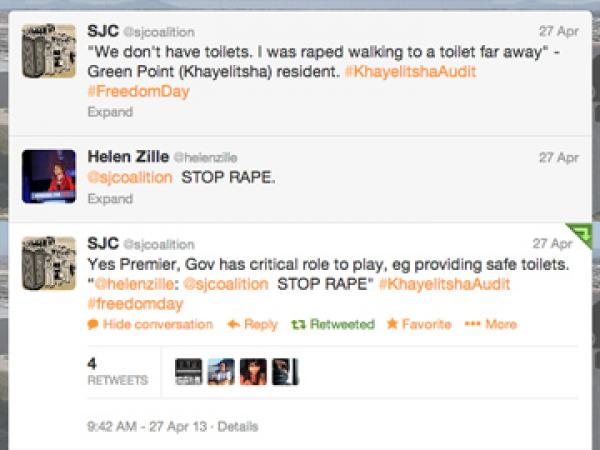Responding to criticism

The Democratic Alliance markets itself as an efficient and un-corrupt alternative to the ANC. It never hesitates to point out serious service delivery failures by the ANC. So it is interesting to see its responses to the Social Justice Coalition’s criticisms of the City of Cape Town’s handling of a major toilet supply contract in Khayelitsha.
For years the Social Justice Coalition (SJC) has been campaigning to get decent sanitation for informal settlements in Khayelitsha. This weekend the SJC released the data from its audit of toilets. As explained in today’s article published on GroundUp and on the front page of yesterday’s Cape Times, the company the City contracted to provide toilets is failing to deliver. There might be some good reasons for this, but it is nevertheless failing.
This is from the City’s response to the SJC:
[W]e have worked with a number of organisations including the SJC, who have provided assistance in a City-run project to provide janitorial services to clean flush toilets and standpipes, and report cases where extensive repairs are needed in Khayelitsha. It is therefore disappointing that the SJC, fully cognisant of the efforts we are making, chooses to conduct an informal ‘audit’ pointing out where maintenance is not taking place as it should via public platforms, rather than bring the problem areas directly to the City’s attention so they can be fixed immediately.
There is much in the City’s statement about how it is providing toilets and the challenges of doing so. Not one line in the statement responds to the problems of the specific failing contract. The SJC is an activist organisation with a duty to bring service delivery failures by government, no matter who is in power, to the attention of the public. The City’s implication that the SJC should bring a severe and ongoing service delivery failure (and one on which GroundUp has reported before) to its attention without making it public is strange.
Premier Zille’s tweets are particularly defensive. In response to the toilet service delivery failures, she interspersed some sensible tweets, such as explaining that Cape Town’s rapid urbanisation makes delivery hard with some very callous remarks such as, “Every family could have their own toilet by now if it were not for the huge amount we have to spend fixing vandalism.” Some of her tweets insisted that Khayelitsha’s residents should take responsibility for cleaning the communal toilets, such as “Because it is easier for [Gavin Silber of the SJC] to blame the City than it is to encourage ppl to share responsibility.” This attitude avoids the point that the City has to do more to properly deliver, install and maintain toilets in large portions of Khayelitsha.
The SJC tweeted about a woman who was raped on her way to relieve herself at an outdoor toilet. Zille’s response was a curt, “STOP RAPE.” There is not the slightest acknowledgement that a woman should not have to walk a long way off her property to get to a loo, which is something government can do more to remedy. In other tweets she mentioned that her husband grew up with the bucket system and that people in his community kept their toilets clean. To compare her husband’s circumstances as a child, however deprived they might have been, with someone living in a shack in RR Section in Khayelitsha is, besides being ridiculous, a failure to understand just how difficult it is for people to get by in modern high-density informal settlements.
I have some sympathy for Zille’s anger. She is often the victim of outrageous, rude and childish attacks, especially by ANC leaders. But the criticisms Cape Town’s government faces from the SJC, while sometimes understandably angry, are of a different order of seriousness and intent from people who experience service delivery failures directly. Might less defensiveness and a clearer commitment to fixing the specific problems raised be a better approach, perhaps?
Support independent journalism
Donate using Payfast

Don't miss out on the latest news
We respect your privacy, and promise we won't spam you.

This article is licensed under a Creative Commons Attribution-NoDerivatives 4.0 International License.
